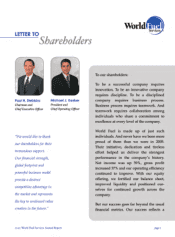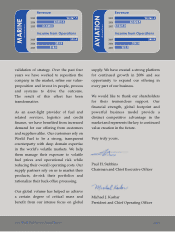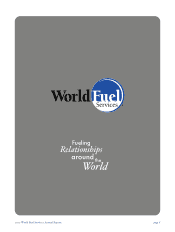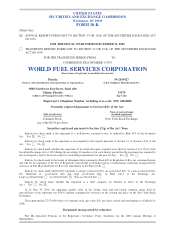World Fuel Services 2005 Annual Report Download - page 16
Download and view the complete annual report
Please find page 16 of the 2005 World Fuel Services annual report below. You can navigate through the pages in the report by either clicking on the pages listed below, or by using the keyword search tool below to find specific information within the annual report.also act as a broker and as a source of market information for the end user, negotiate the transaction by arranging
the fuel purchase contract between the supplier and the end user, and expedite the arrangements for the delivery
of fuel. For these services, we are paid a commission from the supplier.
We purchase our marine fuel from suppliers worldwide. We enter into derivative contracts in order to
mitigate the risk of market price fluctuations, and to offer our customers fuel pricing alternatives to meet their
needs. Our cost of fuel is generally tied to spot pricing, market-based formulas or is governmentally controlled.
We are usually extended unsecured trade credit from our suppliers for our fuel purchases. However, certain
suppliers require us to provide a letter of credit. We may prepay our fuel purchases to take advantage of financial
discounts, when limited by amount of credit extended to us by suppliers or as required to transact business in
certain countries.
Because we typically arrange to have fuel delivered by our suppliers directly to our customers, inventory is
maintained only for competitive reasons and at minimum operating levels. Inventory is maintained at two
locations and is hedged in an effort to protect us against price risks. We have arrangements with our suppliers
and other third parties for the storage and delivery of fuel.
We utilize subcontractors to provide various services to customers, including fueling of vessels in port and
at sea, and transportation of fuel and fuel products.
During each of the periods presented in the accompanying consolidated statements of income, none of our
marine customers accounted for more than 10% of total consolidated revenue.
Aviation Segment
We market aviation fuel and related services to major commercial airlines, second and third-tier airlines,
cargo carriers, regional and low cost carriers, corporate fleets, fractional operators, private aircraft, military fleets
and to the United States and foreign governments. Our aviation related services include fuel management, price
risk management, arranging ground handling and international trip planning, including flights plans, weather
reports and overflight permits. We have developed an extensive network that enables us to provide aviation fuel
and related services throughout most of the world under the following trade names: World Fuel, Baseops,
Airdata, PetroServicios de Mexico, and PetroServicios de Costa Rica.
In general, the aviation industry is capital intensive and highly leveraged. Recognizing the financial risks of
the airline industry, fuel suppliers generally refrain from extending unsecured lines of credit to airlines and avoid
doing business with airlines directly. Consequently, most carriers are required to post a cash collateralized letter
of credit or prepay for fuel purchases. This negatively impacts the airlines’ working capital. We recognize that
the extension of credit is a risk, but also a significant area of opportunity. Accordingly, we extend unsecured
credit to most of our customers.
We purchase our aviation fuel from suppliers worldwide. Our cost of fuel is generally tied to market-based
formulas or is government controlled. We are usually extended unsecured trade credit from our suppliers for our
fuel purchases. However, certain suppliers require us to provide a letter of credit. We may prepay our fuel
purchases to take advantage of financial discounts, when limited by amount of credit extended to us by suppliers
or as required to transact business in certain countries.
Fuel is typically delivered into our customers’ aircraft or designated storage directly from our suppliers or
from our fuel inventory. Inventory is held at multiple locations for competitive reasons and inventory levels are
kept at an operating minimum. Inventory is purchased at airport locations or shipped via pipelines. Inventory in
pipelines is hedged in an effort to protect us against price risks. We have arrangements with our suppliers and
other third parties for the storage and delivery of fuel.
We utilize subcontractors to provide various services to customers, including into-plane fueling at airports
and transportation and storage of fuel and fuel products.
2
























